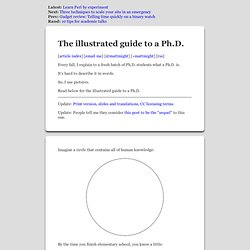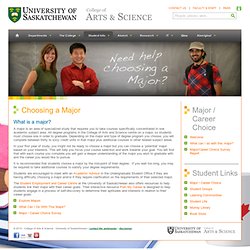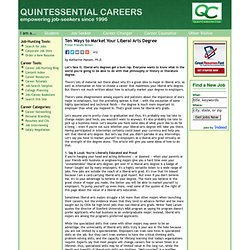

The illustrated guide to a Ph.D. Imagine a circle that contains all of human knowledge: By the time you finish elementary school, you know a little: By the time you finish high school, you know a bit more: With a bachelor's degree, you gain a specialty: A master's degree deepens that specialty: Reading research papers takes you to the edge of human knowledge: Once you're at the boundary, you focus: You push at the boundary for a few years: Until one day, the boundary gives way: And, that dent you've made is called a Ph.D Of course, the world looks different to you now: So, don't forget the bigger picture: Keep pushing.

Related posts If you like these posts, then I recommend the book A PhD Is Not Enough Get it in print; fund students; save lives By request, a print version of The Illustrated Guide to a Ph.D. is on sale. Click here to preview or buy it. Any and all proceeds will fund graduate students whose work may impact the discovery, diagnosis or treatment of genetic disorders. Why biology? License: Creative Commons Resources. Undergraduate Degree != Career ? - education college undergraduate. What do I do when I graduate if I know I don't want to pursue my undergraduate field?

I'm currently a student at a Pretty Good University in the US and I'm (oh my god) going to graduate next year with a B.S. degree in Computer Science, a second major of Environmental Studies, and a minor. I'm doing everything I can to calm my anxiety about this (seeing a therapist, most likely going to get anti-anxiety medication this time), but I am so extremely worried about not knowing what I'm doing next that it's rendered me completely incapable of doing anything without an absolute emotional breakdown (tears, etc). I decided halfway through my major and a couple internships that Computer Science wasn't what I wanted to do with my life, I didn't want to do research in a mathematical science and i didn't want to make a career out of being a programmer. I overwhelmingly feel the need to be planning my next move. I'm trying to pick up "science-y" lab work to gain experience in something new.
Sad commentary on declining value of university degrees. The 25 most difficult questions. If you are one of those executive types unhappy at your present post and embarking on a New Year's resolution to find a new one, here's a helping hand.

The job interview is considered to be the most critical aspect of every expedition that brings you face-to- face with the future boss. One must prepare for it with the same tenacity and quickness as one does for a fencing tournament or a chess match. This article has been excerpted from "PARTING COMPANY: How to Survive the Loss of a Job and Find Another Successfully" by William J. Morin and James C. Cabrera.
Morin is chairman and Cabrera is president of New York-based Drake Beam Morin, nation's major outplacement firm, which has opened offices in Philadelphia. 1. Since this is often the opening question in an interview, be extracareful that you don't run off at the mouth. 2. You should be able to discuss products or services, revenues, reputation, image, goals, problems, management style, people, history and philosophy. Job Profiles - TheCareerProject.org. The Official GMAT Web Site. Students . College of Arts and Science . University of Saskatchewan. A major is an area of specialized study that requires you to take courses specifically concentrated in one academic subject area.

All degree programs in the College of Arts and Science centre on a major, so students must choose one in order to graduate. Depending on the major and type of degree program you choose, you will complete between thirty to sixty credit units in that major plus additional courses in other related subject areas. In your first year of study, you might not be ready to choose a major but you can choose a ‘potential’ major based on your interests.
This will help you focus your course selection and work towards your goal. Ten Ways to Market Your Liberal Arts Degree. Printer-Friendly Version by Katharine Hansen, Ph.D.

Let's face it; liberal-arts degrees get a bum rap. 5 Things Every College Grad Should Know. Is Getting A College Degree Worth It These Days?